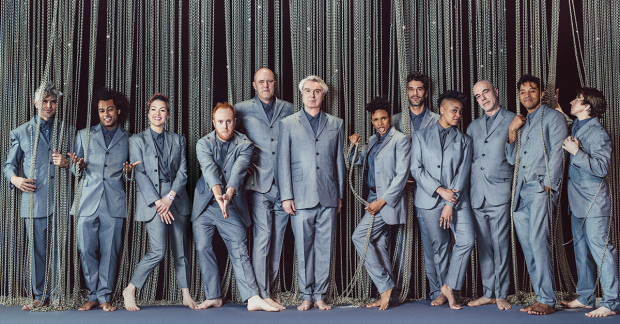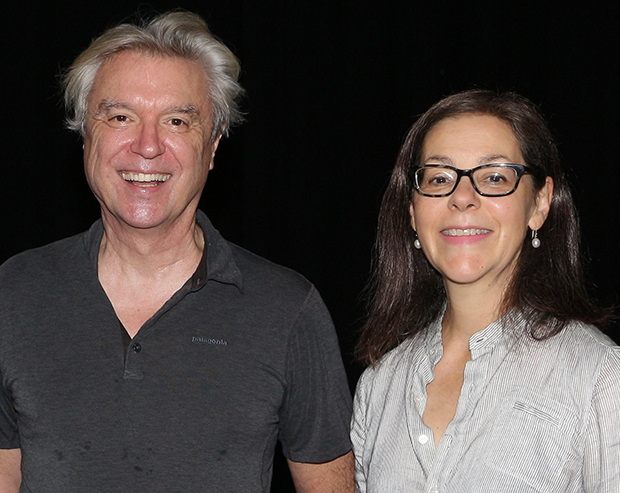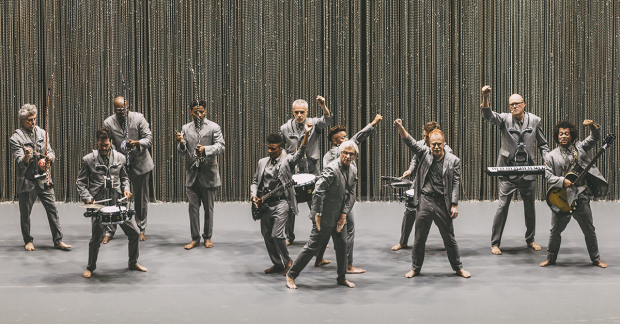How the Front Man of Talking Heads Built an American Utopia on Broadway
In the 1980s, David Byrne and his band Talking Heads pioneered the sound we now know as New Wave. They gave the world songs like "Psycho Killer," "Burning Down the House," "Take Me to the River," and "Once in a Lifetime."
In 2018, Byrne released his first solo album in 14 years, American Utopia, and later created a stage project inspired by the album along with his Here Lies Love collaborators Annie-B Parson (staging and choreography) and Alex Timbers (production consultant). After an international tour and a run in Boston, Byrne will bring American Utopia to the Hudson Theatre on Broadway, a place Byrne never intended to perform.
American Utopia, the theatrical concert, will find Byrne backed by an 11-piece marching band that's entirely untethered from cords and wires. The set list will combine tracks from the album, several Talking Heads hits, and even a song by Janelle Monáe. Performances will begin on October 4. It promises to be unlike anything Broadway has ever seen.
He may be asking himself, Well…how did he get here?
He doesn't even know the answer.

(© Brian Derballa)
What was the genesis of American Utopia both as an album and as a show?
David Byrne: Sometimes, an album is a snapshot of the time it's made. The songs, and probably more the show, represent an idea of possibility, that we could be different than we are, how to be better than we are, and our longing to discover how to be a community. It was only after it was made that I decided to call it American Utopia, which is a big step.
As I was making the record, I had these visions of percussive energy, of drummers in a drum line marching from downstage to upstage. I just thought, "What if we could actually make a show like that? What if we brought all those marching bands that usually perform outdoors and allowed them to move around indoors?" All the technical stuff took about a year to figure out, but it works.
What do you mean?
David: The technology that goes into making something appear simple and invisible to the audience was a lot to figure out. The musicians are carrying wireless instruments. The keyboards, for example, can change their sounds onstage by transmitting midi signals to computers that are all stored offstage. The guitar amps are digital replicas of guitar amps. And there are six drummers.
Annie-B Parson: What David explained to me was that we'd be in a white box, it would be cordless, everyone would wear gray suits, and they would never leave the stage. In that, you hear the rejection of a lot of rock band stuff. You hear the rejection of the sloppy clothing that a lot of men wear when they're doing rock shows, the rejection of the drum kit on the platform, the standing mics, the cords on the floor, all the stuff you usually see. It's very neat and meticulous, with a formality and minimalist aesthetic to the look. It's very postmodern.

(© David Gordon)
What does the idea of being on Broadway mean to you? Was this a career goal?
David: It's not something I've always wanted to do. I've seen clips of Hal Prince and people like that talking about designing sets and stuff when they were 10. I was not one of those people. I have had a great love of theater ever since I moved to New York in the late '70s. But, the idea of coming to Broadway is still really exciting and terrifying.
Annie-B: We're really curious to see how this show speaks to the Broadway audience, because the cool thing is the problem of Broadway. It's a lot of people from out of town, it's a lot of people who don't know David's work, and it's a lot of people who are used to a certain movement aesthetic, which is from a very, very different tradition. I am not being hyperbolic when I say that the movement will literally not look like any movement anybody has ever seen in that real estate in New York. Whether it flies or not, who knows?
What have you learned about the set list and how the audience reacts to it over the course of the development process?
Annie-B: The shaping of that set list still continues. When David sent me the album, he told me that he would choose those songs, and then he would add some of his canon.
David: I have a big enough catalogue that I can pick songs that are well known that fit the narrative arc of the show. We are still making changes.
Annie-B: The audience reaction was shocking to us. We thought we made something cool, but we never really talked about it in those terms, because your head is down and you're doing your thing. And then the response was crazy. It wasn't just, "We love it," which is wonderful, and David always gets that. It was, "You changed the rules. Nobody's ever done this before." It's groundbreaking.

(© Catalina Kulczar)










